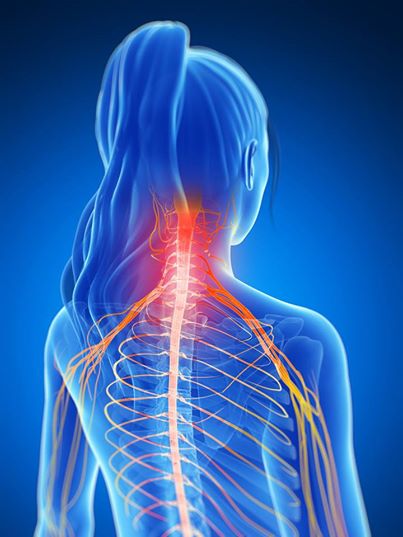RADICULOPATHY

What’s Radiculopathy?
Radiculopathy, sometimes referred to as a pinched nerve, occurs when a nerve in the spine experiences irritation or damage at the root. This condition generally refers to the symptoms caused by compression of nerve roots in the spinal column. These symptoms which range from numbness and tingling in the upper extremities to total loss of sensation can occur in different regions of the spinal column.
What’s the Types of Radiculopathy?
The most common types of radiculopathy include cervical radiculopathy, thoracic radiculopathy, and lumbar radiculopathy. Generally, the types of radiculopathy get their classification based on the location of the affected nerve root.
Cervical Radiculopathy
Cervical Radiculopathy occurs when a nerve root in the neck experiences compression or irritation. Cervical radiculopathy can lead to symptoms that affect the neck, upper back, shoulders, and arms. These symptoms may include muscle weakness, tingling, pain, or loss of sensation in the upper extremities.
Thoracic Radiculopathy
Thoracic Radiculopathy occurs when a nerve root in the thoracic area of the spine, (upper and mid back), experiences compression or irritation. Thoracic radiculopathy occurs as the least common type of radiculopathy and can cause symptoms that extend to the front of the body. The symptoms associated with thoracic radiculopathy may include a burning sensation in the chest, numbness, tingling, and radiating pain in the ribs, sides, or abdomen.
Lumbar Radiculopathy
Lumbar Radiculopathy, also known as sciatica, occurs when a nerve root in the lower part of the back experiences compression or irritation. Lumbar radiculopathy can cause symptoms that affect the low back, hips, legs, and in some cases, the bowel and bladder. The symptoms associated with lumbar radiculopathy may include pain and numbness extending from the lower part of the back down to the legs, bowel or bladder incontinence, and loss of sensation in the lower extremities. Paralysis or sexual dysfunction may occur in more severe cases.
What’s the Symptoms of Radiculopathy?
Generalized symptoms of radiculopathy may include:
- Sharp radiating pain in the back, arms, or legs that may worsen with certain activities such as sneezing or sitting.
- Loss of sensation in the upper or lower extremities
- Numbness, tingling, or burning sensations in the arms or legs
- Decreased motor skills
What’s the Causes and Risk Factors of Radiculopathy?
The main cause of radiculopathy remains the narrowing of the space or tunnel where nerve roots exit the spine. This narrowing may occur due to changes in tissues such as bones, tendons, and intervertebral discs, surrounding the nerve roots. Conditions that may lead to radiculopathy include:
- Bone spurs
- Compression fractures
- Degenerative disc disease
- Herniated discs
- Osteoarthritis
- Spinal tumors
- Spondylolisthesis
Other risk factors for radiculopathy may include ageing, smoking, obesity, poor posture, and spinal abnormalities such as scoliosis.
How do Spinal Specialists Diagnose Radiculopathy?
A spinal specialist will request the patient’s complete medical history and may carry out a thorough physical examination to evaluate the patient’s symptoms. The physical examination will aim to check for the patient’s muscle strength and reflexes. The specialist may also recommend some imaging tests such as an X-ray, CT scan or MRI scan, to help provide clear images of the structures surrounding the affected area.
What’s the Treatment Options for Radiculopathy?
Treatment options for radiculopathy mostly involve non-surgical procedures such as physical therapy to strengthen muscles and reduce inflammation. Other non-surgical treatment options for radiculopathy may include the use of steroid injections to reduce inflammation and medications such as non-steroidal anti-inflammatory drugs to relieve pain.
Specialists may recommend surgical procedures such as a discectomy to free the affected nerve from pressure in the case where non-surgical treatment options fail to provide relief.
References
American Academy of Orthopaedic Surgeons. Cervical radiculopathy (pinched nerve). (https://orthoinfo.aaos.org/en/diseases–conditions/cervical-radiculopathy-pinched-nerve/)
North American Spine Society. Cervical stenosis, myelopathy and radiculopathy. (https://www.spine.org/KnowYourBack/Conditions/Degenerative-Conditions/Cervical-Stenosis-Myelopathy-and-Radiculopathy)
Leininger B, Bronfort G, Evans R, Reiter T (February 2011). “Spinal manipulation or mobilization for radiculopathy: a systematic review”. Physical Medicine and Rehabilitation Clinics of North America. 22 (1): 105–25.
